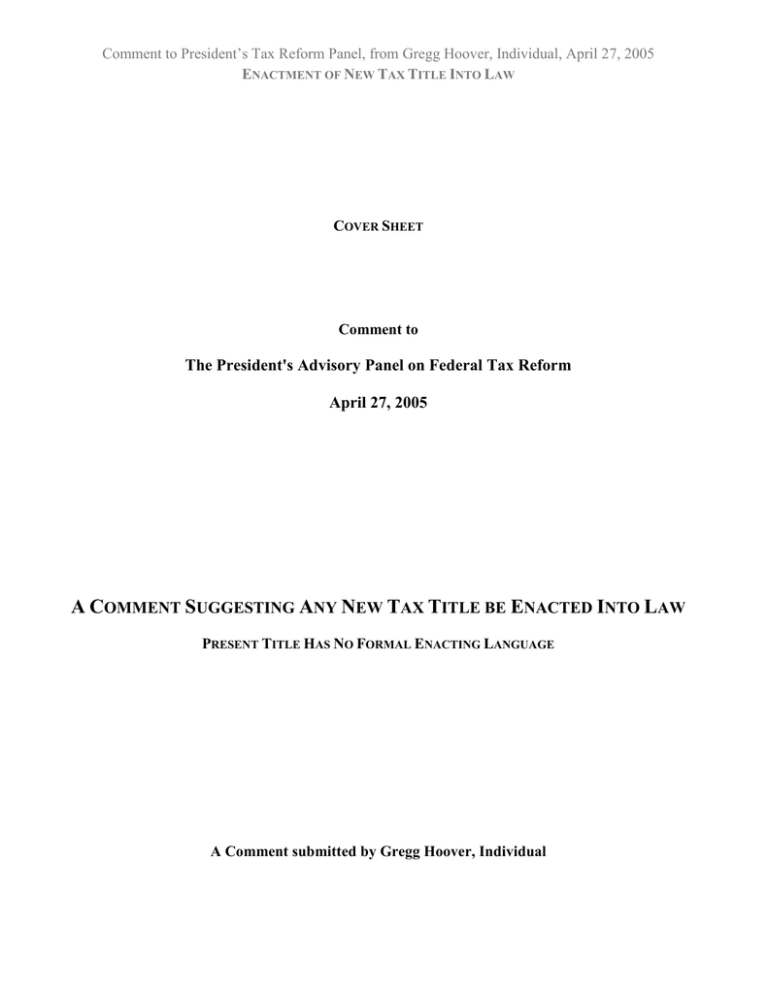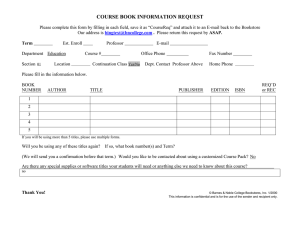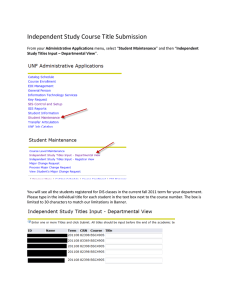A C S N
advertisement

Comment to President’s Tax Reform Panel, from Gregg Hoover, Individual, April 27, 2005 ENACTMENT OF NEW TAX TITLE INTO LAW COVER SHEET Comment to The President's Advisory Panel on Federal Tax Reform April 27, 2005 A COMMENT SUGGESTING ANY NEW TAX TITLE BE ENACTED INTO LAW PRESENT TITLE HAS NO FORMAL ENACTING LANGUAGE A Comment submitted by Gregg Hoover, Individual Comment to President’s Tax Reform Panel, from Gregg Hoover, Individual, April 27, 2005 ENACTMENT OF NEW TAX TITLE INTO LAW 1. The right to formally enacted law The public has the right to have the laws that govern them enacted formally and unequivocally as law, both by language and intent in the statutes at large, and in the US Code of Laws. The present tax code has not been so enacted in language or intent in either of these. Present federal tax titles are law in effect only, not in fact. We obey our present code much from fear, not from respect. 2. Present tax titles do not contain specific language enacting them into law Present tax titles have no language enacting them into law, either as part of the US Code, or in the statutes-at-large. The US Code specifically excludes Title 26 as one enacted as law, as the Speaker of the House states in his forward to the US Code. Neither is there enactment into law of the underlying prima facie statute containing the present tax titles. The enacting language in the legislation underlying the Internal Revenue Titles of 1954 and 1986, unlike the Internal Revenue Title of 1939, do not include the phrase “hereby enacted into law”, but only “is as follows”. 3. Applicability and effective date language of present tax laws within title, in section 7851 Unlike the Internal Revenue Title of 1939, language containing applicability and effective date provisions of the present tax titles are not part of the enacting clauses, where they must by any rational construction be, but instead are part of the title itself. In the present titles, applicability and effective date language for them, along with 1939 tax title repeal language, is in section 7851. But, it contains language making applicability conditional upon enactment of the title. For the applicability of a law to have language within it making it conditional upon its enactment is irrational, and contradictory. The passage by Congress, and signing by the President, of a bill, is enactment. The appearance of section 7851 within the passed legislation makes it effective, but only if the title contained within the bill is enacted as law by intent and language of the bill. There is no such intent expressed in enacting clauses of the Internal Revenue Titles of 1986 or 1954. Comment to President’s Tax Reform Panel, from Gregg Hoover, Individual, April 27, 2005 ENACTMENT OF NEW TAX TITLE INTO LAW 4. Congress amends repealed legislation, confirming present tax titles are not law The evidence that the present titles are not enacted as law, and that the Internal Revenue Title of 1939 is still law, is the many amendments to the Internal Revenue Title of 1939 after Section 7851 language makes concurrent effectiveness of 1939 and present titles impossible. Congress amended sections of the 1939 title, even many specifically repealed by the language of 7851, many dozens of times over the decades since the legislation containing the 1954 title was enacted, just as it would have done if the 1939 tax code was still law. Congress made these amendments even when provisions of these amended sections are protected and transferred to parallel provisions in the new titles. (See “Laws Affected Tables for 1956-1970”, Volumes 70-84, Unites States Statutes at Large, Office of the Federal Register, National Archives and Records Service, General Services Administration, by James B. Rhodes, Archivist of the United States, and Arthur F. Sampson, Acting Administrator, GSA, for a partial listing of these amendments.) 5. Applicability and effective date language of present tax laws within title, in section 7851 Unlike the Internal Revenue Title of 1939, applicability and effective date provisions of the present tax titles are part of the title, not part of the enacting clauses, where they must, by any rational construction, be. In the present titles, applicability and effective date language for them, along with 1939 tax title repeal language, is in section 7851, but is conditional upon enactment of the titles. For the applicability of a law to have language within it making it conditional upon its enactment is irrational, and contradictory. The passage by Congress, and signing by the President, of a bill, is enactment. The appearance of section 7851 within the passed legislation makes it effective, but only if the title contained within the bill is by intent and language of the bill enacted as law. There is no such intent expressed in the Internal Revenue Titles of 1986 or 1954. Comment to President’s Tax Reform Panel, from Gregg Hoover, Individual, April 27, 2005 ENACTMENT OF NEW TAX TITLE INTO LAW 6. Present tax titles are, in language and intent, little more than proposed legislation Although US citizens are bound by and obey the present tax title, we do so without Congressional legislative language or intent making the title law in any form whatsoever. This is an embarrassment to Congress, the President, to the nation, and an affront to civilized lawmaking. Out respect for Congress is only lessened by the unacceptable quality of language and structure of the present tax title, and for their careless, almost arrogant failure to use formal enacting language. This error must not be repeated in any new tax title. 7. Suggestion to the President’s Panel I urge the Panel to find that, in addition to its finding that the present code is unacceptable in its complexity and unfairness, that it is unacceptable also in form as legislation for a civilized society. We deserve legitimately organized tax law, with language specifically enacting it into law. Congress must not have the temerity to use its authority to use language actually enacting a new tax title into law in both form and substance. Please recommend to the President that the Internal Revenue Title of 1939 serve as a model for the language construction for any new internal revenue title, with effective date and repeal provisions and the words “herein enacted into law” in the enacting clauses of the title, where they belong. Thank you for taking my comment. Respectfully, Gregg Hoover, Individual, April 27, 2005

